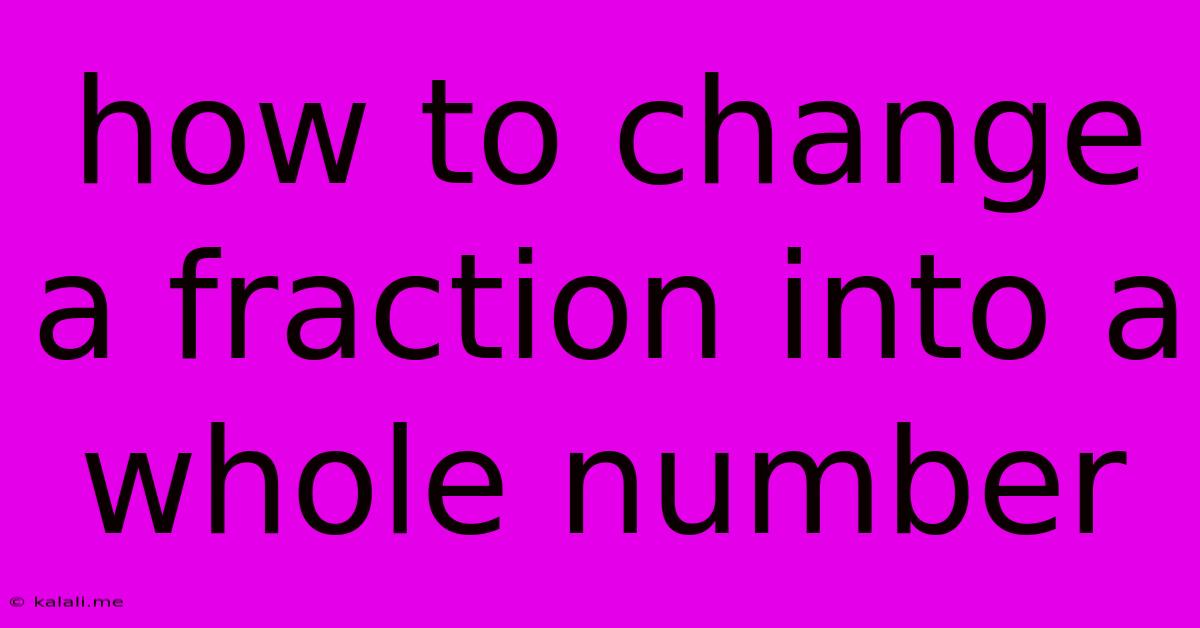How To Change A Fraction Into A Whole Number
Kalali
May 31, 2025 · 3 min read

Table of Contents
How to Change a Fraction into a Whole Number: A Simple Guide
Fractions represent parts of a whole. But what if you want to express that part as a whole number? This article explains how to convert a fraction into a whole number, covering various scenarios and helpful tips. Understanding this process is crucial for various mathematical operations and real-world applications. This guide will cover the core concept, step-by-step instructions, and examples to ensure a comprehensive understanding.
When Can a Fraction Become a Whole Number?
Not all fractions can be converted into whole numbers. A fraction can only be transformed into a whole number if the numerator (the top number) is a multiple of the denominator (the bottom number). In simpler terms, the numerator must be divisible by the denominator without any remainder. For example, 4/2 can be converted because 4 is divisible by 2. However, 3/2 cannot be directly converted because 3 is not divisible by 2.
Method 1: Simplifying Fractions
The most common method involves simplifying the fraction to its lowest terms. This means dividing both the numerator and the denominator by their greatest common divisor (GCD). If, after simplification, the denominator becomes 1, the numerator represents the whole number equivalent.
Step-by-Step Instructions:
-
Find the Greatest Common Divisor (GCD): Identify the largest number that divides both the numerator and the denominator without leaving a remainder. You can use prime factorization or other methods to find the GCD.
-
Divide the Numerator and Denominator by the GCD: Divide both the numerator and the denominator by the GCD you found in step 1.
-
Check the Result: If the denominator is now 1, the numerator is your whole number equivalent.
Example:
Let's convert the fraction 12/4 into a whole number.
-
GCD: The GCD of 12 and 4 is 4.
-
Division: 12 ÷ 4 = 3 and 4 ÷ 4 = 1.
-
Result: The simplified fraction is 3/1, which equals 3. Therefore, 12/4 as a whole number is 3.
Method 2: Division
Another way to convert a fraction to a whole number (when possible) is through simple division.
Step-by-Step Instructions:
-
Divide the Numerator by the Denominator: Perform the division of the numerator by the denominator.
-
Check for Remainders: If the division results in a whole number with no remainder, that whole number is your equivalent. If there's a remainder, the fraction cannot be directly converted to a whole number.
Example:
Let's convert the fraction 15/5 into a whole number.
-
Division: 15 ÷ 5 = 3
-
Remainder: There's no remainder. Therefore, 15/5 as a whole number is 3.
Dealing with Fractions that Cannot Be Whole Numbers:
If the fraction cannot be simplified to have a denominator of 1 (meaning the numerator is not a multiple of the denominator), it remains a fraction. You might need to express it as a mixed number (a whole number and a fraction) or a decimal. For example, 7/3 can be expressed as the mixed number 2 1/3 or the decimal 2.333...
Conclusion:
Converting fractions to whole numbers is a straightforward process that requires understanding divisibility and simplification. By following the steps outlined above, you can easily determine whether a fraction can be represented as a whole number and, if so, find its equivalent. Remember that only fractions where the numerator is a multiple of the denominator can be converted into whole numbers. Mastering this skill is essential for various mathematical calculations and problem-solving.
Latest Posts
Latest Posts
-
Does Ice Weigh The Same As Water
Jun 02, 2025
-
Is Queso Fresco Similar To Blue Cheese
Jun 02, 2025
-
Circle With Plus Sign Symbol On Android
Jun 02, 2025
-
How To Remove A Stuck Valve Stem Cap
Jun 02, 2025
-
How To Get Rid Of Drain Flies In Bathroom
Jun 02, 2025
Related Post
Thank you for visiting our website which covers about How To Change A Fraction Into A Whole Number . We hope the information provided has been useful to you. Feel free to contact us if you have any questions or need further assistance. See you next time and don't miss to bookmark.